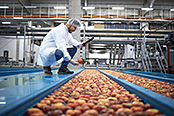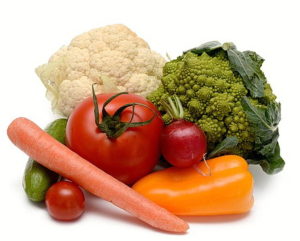
Pesticides – those scary chemicals that kill insects so that they will stop ruining the crops that we eat. But if pesticides are harmful to insects, are they harmful to humans? What is being done to avoid eating pesticide-laden foods? Let’s find out.
When you think of organic foods, you probably imagine crunchy kale, juicy apples, and other produce with leaves that look like they’ve been touched by a magic wand. Perhaps you assume these foods are expensive and taste weird. However, we now know that these assumptions are misguided.
Conventional fruits and vegetables are often loaded with synthetic fertilizers and other rather nasty ingredients. But what exactly does it mean for something to be organic? Do these foods taste better? Is it worth your money to buy them?
What Does “Organic” Actually Mean?
Organic foods are produced without synthetic pesticides or fertilizers. They are typically raised without antibiotics or hormones. Additionally, organic livestock is kept in conditions that are more humane and minimizes stress and pain than those of factory-farmed animals, so if you are an animal lover, this should whet your appetite.
Why Buy Organic Foods?
When you buy food that isn’t certified organic, you’re likely eating produce that has been treated with toxic synthetic pesticides as previously mentioned. These chemicals can be found in conventional produce, as well as meat and eggs. The Environmental Protection Agency (EPA) allows conventionally grown fruits and vegetables to be doused with a staggering number of pesticides. Why? Because the government believes that trace amounts of pesticides on conventionally grown foods are not harmful to humans.
Let’s take grapes as an example. One pesticide, methyl trifluoride (yes, that’s a word!), is allowed on grapes. In one application, up to 1.5 million pounds of this stuff can be sprayed on a single acre of grapevines.
So Why are Pesticides Bad for Your Health?

Let’s put it this way – anything artificial added to food items would not make the good food health list and synthetic pesticides, which they all are, can potentially wreak havoc on your gut over the years. Besides synthetic pesticides, processed foods can also fall into this category. That doesn’t mean that everyone in this world who eats non-organic or processed foods is prone to disease, but wouldn’t it be nice if we do whatever is possible to avoid such a risk?
Quoting from nature.com, “… [when] eating a non-organic apple, you are also eating over 30 different pesticides that have been sprayed on the apple“. And pesticides can be a potential risk for cancer, and Alzheimer’s Disease, and can have reproductive issues.
Which Foods are Best to Buy Organic?
While all organic foods are better than conventionally grown foods, some are more important to buy than others. These foods are most likely to contain high levels of pesticide residue. That makes it even more important to buy organic. These foods include: Grapes – Strawberries – Apples – Peaches – Bell peppers – Tomatoes – Celery – Spinach – Potatoes
How to Find Truly Organic Food

When you’re buying produce, you will want to look for the USDA Organic seal. This seal means that the food is certified organic and has met the government’s standards for being grown organically.
The same applies to meat, eggs, and dairy products. You will want to make sure they are certified. But what if you can’t find these? You can also look for foods that are certified by third parties; such as certification seals like these: – Certified Humane – Global Aquaculture Alliance – Animal Welfare Approved – Non-GMO Project – Food Alliance – Organic Materials Review Institute These seals indicate that a third-party certifying agency has verified that a product has been produced according to organic standards.
The Big Problem with Organic Foods
The problem is that they cost more. Organic produce is twice as expensive as conventionally grown produce. Organic dairy and meat products can be even more expensive. And while these foods can be a good investment in your health, they may not be worth it for everyone.
If you are living on a limited budget, it’s possible it would be better to buy non-organic foods. For example, you may be able to get all the nutrients you need from a non-organic diet that costs a lot less per person. And while eating organic foods can be beneficial, it’s important to remember that eating anything is better than eating nothing at all.
Final Words
The bottom line is this: Eating organic foods is not a frivolous thing to do. It is a way to protect yourself and your family from harmful pesticides that are sprayed on non-organic crops. If you can afford to buy them, they are worth the money.
Organic produce has fewer pesticide residues and more nutrients and is less likely to be contaminated with pathogens such as E. coli and salmonella. Better care is given to organic farm aminals. The farming methods are also better for the environment, reducing pesticide and fertilizer runoff into nearby waterways. So eat up and enjoy!
